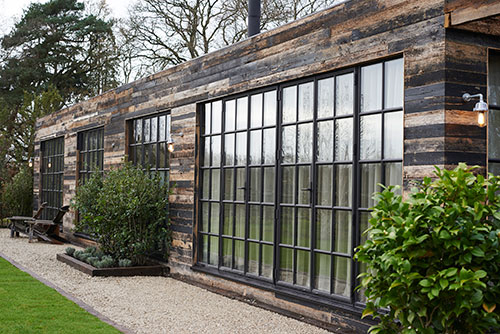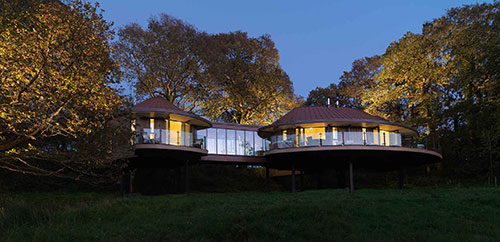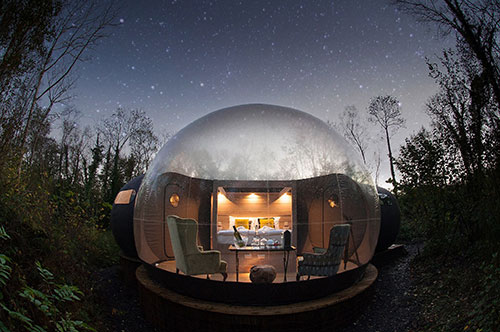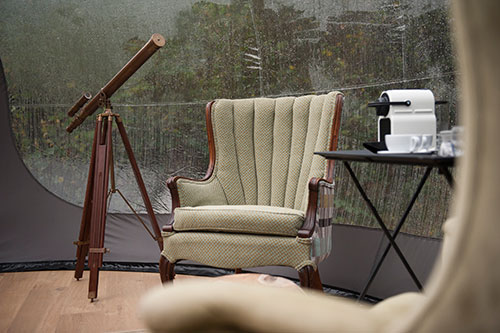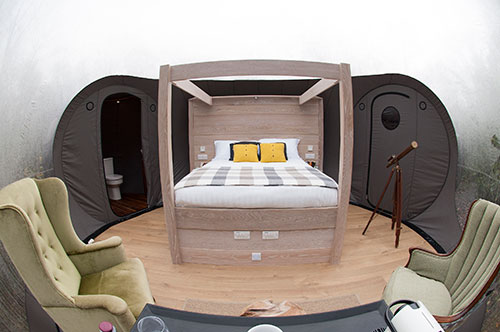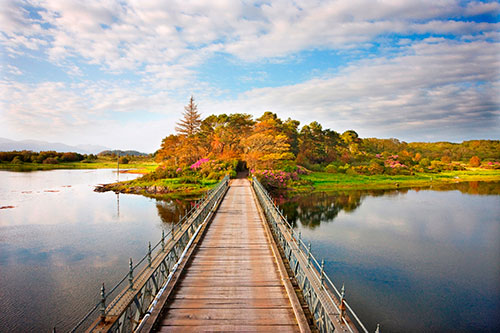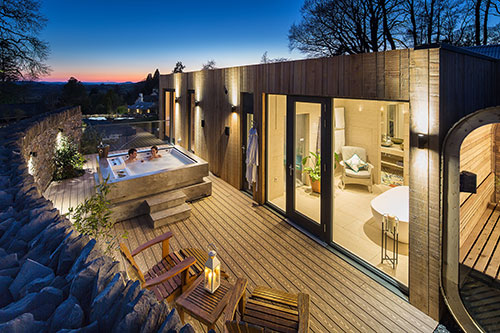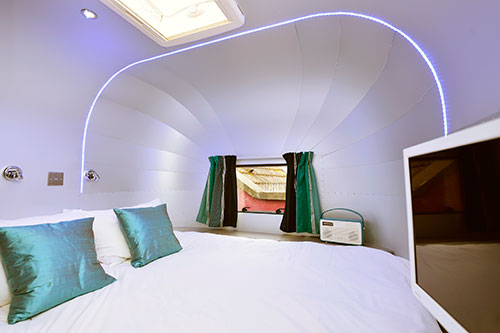Spaced out: why unusual hotel rooms are reaping rewards
Adding an unusual space to your hotel for guests can unlock new income, generate PR buzz and even attract a brand new demographic. Stephanie Sparrow investigates these delightfully odd success stories
Owners of boutique, mid-market, and luxury five-star properties are developing innovative stand-alone places to sleep, eat or relax in - from retro rooftop caravans to space-age bubble domes. They know that brave ideas bring benefits: quirky accommodation offers a good PR hook, while return on investment is accelerated by guests' enthusiasm.
Marketing specialists agree. Success lies in offering "new possibilities" alongside comfort and luxury, says Jenna Law, expert in user experience at creativity and marketing specialists Wolff Olins. "Feeling at home while accessing truly extraordinary experiences is the future of travel hospitality."
Bert's Box at the Pig (above and below)
At Home Grown Hotels, operator of the Pig collection of four properties, founder and chairman Robin Hutson says that a "completely flexible approach to square footage" has seen him deploy huts, apple stores and Bert's Box bedrooms (the latter a luxury, prefabricated unit). "The unusual ways in which we add space to our hotels were born out of necessity," he says. "Our concept is that we like to have 30 bedrooms, but we work with listed buildings that don't come with a standard number of rooms and where it might not be possible to form extensions."
Imaginative structures broaden possibilities and the guest demographic. Andrew Stembridge, managing director of the five-AA-red star Chewton Glen, says that opening 12 treehouse suites in 2012 "has extended the hotel's audience" by attracting young families and "safeguarding a future market". He explains that the novel design (the suites are supported on stilts in the tree canopy) intrigues children, but the level of luxury, which includes hot tubs on the balconies, offers respite to parents. The total cost of £11.8m has taken more than three years to recoup, but the benefits of the project have inspired another treehouse for 2017.
Chewton Glen treehouse (above and below)
"If we had put in the same volume of rooms as an extension, it would have cost half of that," he admits, "but it wouldn't have the same atmosphere. The additional cost is covered by the added appeal."
His guests enthuse about the tranquil setting in a valley by the hotel. "People are looking for unique experiences," he says. "They want to get closer to nature, but not be in a tent. And of course they can visit the restaurant and spa."
Unspoilt, quiet settings are the new must-haves for guests, says Michael Beare, director of Finn Lough resort in Fermanagh, Northern Ireland. "The definition of luxury is changing to mean the nature and privacy which people once took for granted."
Beare, a former engineer, has designed Forest Domes, which are manufactured to his specification in Europe. The bubble domes, which boast locally built four-poster beds and adjacent bathrooms, feature transparent walls at the front to allow 180° views of the Enniskillen site. The rest of the forest and lake resort includes a hotel, lodges and a soon-to-open spa.
Finn Lough Forest Dome (above and below)
"We think the new five star is about peace and high-quality finishes," he says of the domes, which occupy individual gated plots to guarantee privacy.
Since they were installed last November, the first two domes have enjoyed 100% occupancy, which has encouraged him to commission four more to be sited by June. Total installation costs will be around £160,000, and with rates averaging £195 in the week and £230 at the weekend (including breakfast) he expects payback within two years for each dome.
Privacy and flexibility contribute to the success of the Hilltop Reserves on the Isle of Eriska, says director Beppo Buchanan-Smith. "People want to be private and secluded, but not remote," he says, "and what they want more than anything else is choice." He opened two self-catering lodges with hot tubs in 2014 and now sees them running at 75% occupancy, "which is better than the hotel" he says. "They are also non-seasonal."
Isle of Eriska (above and below)
A new breed of guests
Stand-alone accommodation can boost food and beverage revenue by attracting a new breed of guests that would prefer to stay outside of the hotel, but still enjoy the communal aspect of its restaurants and bars. Buchanan-Smith says the Hilltop Reserves allow guests to experience the island's facilities and augment food and beverage revenue without having to increase the size of the hotel.
The Hilltop Reserves are part of a time-share scheme, allowing multiple owners to purchase seven nights a year for 10 years for a total of £10,000 per person. Each lodge has 25 members, who can take their weekly allocation in blocks of three or four nights during a year, leaving free weeks to be sold to the public.
Buchanan-Smith has planning permission for another two Reserves, which he estimates will cost £150,000 each. He hopes to build 10 in total, which he will fund incrementally with the timeshare scheme.
Ultimately, the advantages of developing accommodation which is quirky, stand-alone or both, are that they distinguish the property from the competition while creating different revenue streams. This is the opinion of Mark Godfrey, managing director of the Deer Park Country House Hotel in Honiton, Devon, which opened a treehouse in May 2015.
A treehouse at the Deer Park Country House hotel
"We are predominantly a wedding venue and we wanted a suite that melted brides' hearts," he says of the £200,000 construction. Newlyweds, who usually celebrate the rest of their nuptials at the hotel, pay around £375 for the treehouse and breakfast. "Because of the weddings it brings to us, it will have paid for itself by the end of 2016," he says.
This summer he will unveil the £300,000 redevelopment of the Motor House suite over the estate's original garage. Designed to accommodate the best man and groom before the wedding, Godfrey has installed loft hatches so that they can see the five classic cars below. The bride and her friends are not forgotten, and from this May can avail themselves of the Old Squash Court, where a £250,000 timber-clad, three-bedroom house has been built on the site of the 1930s sports hall.
All these facilities boost the profile of wedding packages and promote the Deer Park as a creative venue. "We have got to impress with our points of difference," says Godfrey.
Planning permission
Building stand-alone "extensions", or installing modular structures can solve the time constraints of working within a hotel itself without disrupting guests. But there are no timesavers where legislation is concerned.
Only the most portable and short-term accommodation will avoid planning permission and it is always advisable to contact the local planning authority, as Adrian Walker (member of the Royal Town Planning Institute), at property advisers Collier International. He explains: "The hard and fast rule is that if you are creating external space for a hotel you would need planning permission, as you would for any sort of structure," says Walker, who is associate director in the planning department. "And even if there is some doubt it is best to check, because there are always rules and exclusions, and local issues, such as the impact on biodiversity and nature conservation, which must be considered before planning permission is granted."
Only temporary structures are exempt. "You would only be permitted to progress without planning permission for any temporary structure which is to be placed there for 28 days or less, such as a yurt, and this period includes the time taken to erect and dismantle the structure," he says.
Walker also highlights the extent of rules applied to listed buildings. "Planning permission and listed building consent are needed for work in the curtilage [grounds] of the hotel even if they are not touching the building at all."
Does it have to be unusual?
So, quirky units have PR appeal - but does this mean that a more conventional stand-alone building will be ignored? Not at all, says Chris Ward, commercial director of Farncombe Estate, which renovated Rose Cottage as a luxury unit next to its Dormy House Hotel in Broadway, Worcestershire, at a cost of £250,000. "It has returned this investment within three years of revenue," says Ward.
The cottage boasts a courtyard with a hot tub, and prices start at £470 a night bed and breakfast. Ward says its appeal is the same as other stand-alones: "There is definitely a shift in demand towards accommodation provision that allows complete privacy away from other guests, but with the benefit of a hotel nearby."
Luxury lodges at Gilpin Hotel & Lake House, Windermere
Guests can enjoy a spa trail without leaving their accommodation, thanks to the five luxury lodges in the grounds of the four-red-AA-star Gilpin Hotel & Lake House, Windermere which opened in January.
Inspired by the success of an actual three-and-a-half-hour spa trail which they introduced at their nearby Lake House hotel in 2012, owners the Cunliffe family created an en-suite version, and built the open-plan bedroom and lounge spa lodges at a total cost of £1.2m.
Ben Cunliffe Architects, owned by the son of the family who own the hotel, met a brief which incorporates rainmaker showers and steam rooms inside, with hydro hot tubs and saunas outside. The lounge area is easily adapted for sessions booked with therapists from the Lake House Jetty Spa and treatment beds are housed in the lodge's wardrobe.
Local company Lakeland Timber Frame manufactured and delivered the prefabricated flat packs. Sitting on steel platforms to provide elevated views, the units are saved from a boxy look by virtue of individual gardens and circular Lakeland stone walls.
Spokeswoman Zoe Cunliffe says that the lodges meet the new style of flexible hospitality which guests expect.
"There is an overall trend of guests wanting to dip in and out of hotels," she says, "while also craving tranquillity and privacy. They are happy to take the three-minute walk to the hotel for dinner."
The rack rate for one night with dinner and breakfast is £635 in a Spa Lodge, in contrast to £335-£505 in the hotel.
Retro Rockets at Brooks Guesthouse, Bristol
When Carla Brooks wanted to add rooms to her 23-bedroom Bristol property, she ordered a crane to lift them onto its pitch roof.
Brooks has bolted four vintage-style caravans, marketed as Retro Rockets, on top of the Brooks Guesthouse, and has seen demand soar since they opened in 2014.
"Even though they cost £10 more a night than rooms in the hotel, they are popular all year round," she says of the polished aluminium caravans, which provide four double rooms.
"People are looking for experiences now and they love that the Rockets are a talking point. Even local people stay because they are on their 'bucket list'."
She was inspired by a holiday in Cape Town, where she spied seven vintage American Airstream trailers parked on top of the Grand Daddy hotel. Rather than import and renovate old caravans from the US, she ordered four - one each of the 16ft and 18ft models and two 20ft models - which were custom-built by Rocket Caravans in Stourport, Worcestershire.
"The original caravans lack insulation qualities and we wanted a product made with modern technology. We also wanted to include luxury specifications, such as pocket-sprung mattresses and Hansgrohe EcoSmart showers," says Brooks. She is tight-lipped about the cost, but says that the buzz they have generated outweighs the lack of instant payback.
Brooks Hotels also owns boutique hotels in Edinburgh and Bath. It recently purchased Pengethley Manor near Hereford, which will open as Brooks Country House this summer. Two Retro Rockets will be installed in the new hotel's vineyard in 2017.
Suppliers
Bert's Box
Finn Lough Forest Domes
Lakeland Timber Frame
Retro Rocket Caravans
Plankbridge
Blackdown Shepherd Huts
Blue Forest
Snoozebox
Yorkshire Yurts
Latest video from The Caterer
Continue reading
You need to be a premium member to view this. Subscribe from just 99p per week.
Already subscribed? Log In



